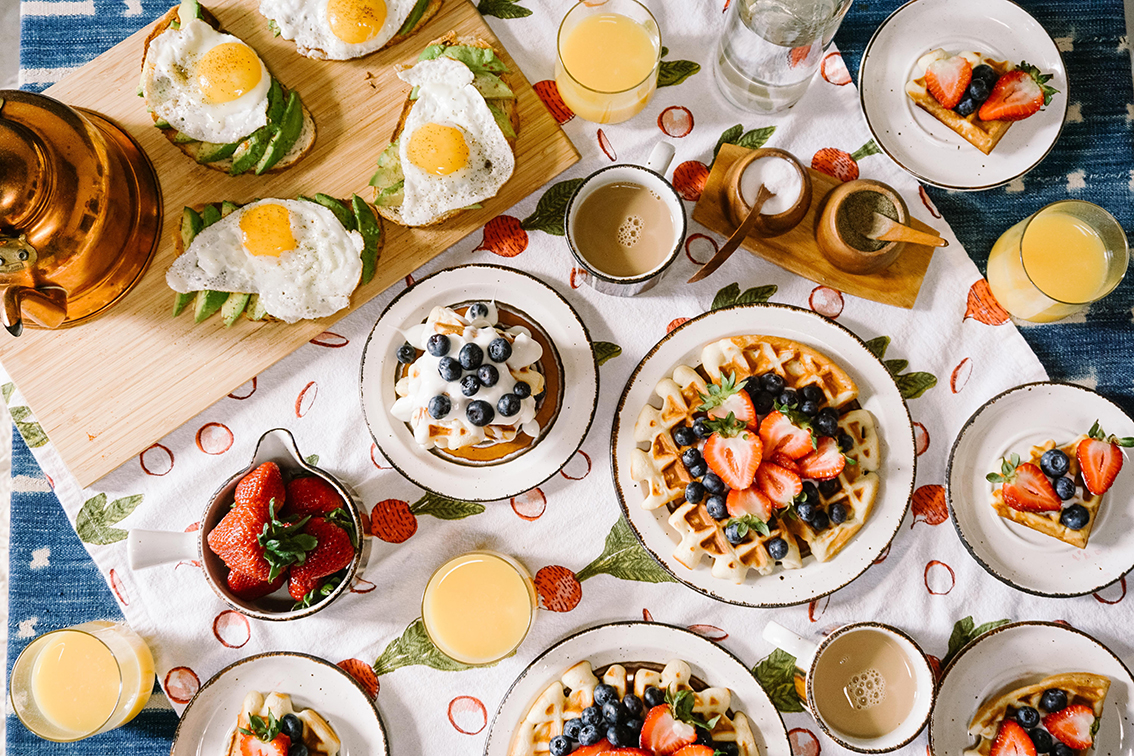Our thankful hurrah isn’t for Guy Beringer’s coining of a word that twinned breakfast with lunch. Before he wrote his pioneering article, Brunch: A Plea, for a London periodical called Hunters’ Weekly, that moniker had already been around for a while.
Beringer deserves our fullest appreciation for something far more important – he defined the purpose and principles of this newfangled word:
“Brunch is cheerful, sociable and inciting. It is talk-compelling. It puts you in a good temper, it makes you satisfied with yourself and your fellow beings, it sweeps away the worries and cobwebs of the week. The advantages of the suggested innovation are, in short, without number, and I submit it is fully time that the old régime of Sunday breakfast made room for the ‘new course’ of Sunday Brunch.”
Crucially, Beringer made the top-hole suggestion that, for Brunch, beers and whiskeys are “admitted as substitutes for tea and coffee”. Like an angel bringing salvation on the Morning After, he forged the unbreakable boozy bond between Brunch and the Night Before:
“The arguments in favour of Brunch are incontestable. In the first place it renders early rising not only unnecessary but ridiculous. You get up when the world is warm, or at least, when it is not so cold. You are, therefore, able to prolong your Saturday nights, heedless of that moral ‘last train’ – the fear of the next morning’s reaction.”
A meal with zeal
Beringer’s plea was on behalf of people hampered by hangovers. It’s a meal that offers sociable types a cheery way to revive themselves on the Morning After with their fellows from the Night Before. Its entire purpose is to counter the dampening effects of missing the “last train” – to be a brightening booster that keeps the party flowing.
Unlike any other meal, Beringer’s Brunch has a specific mission: to banish the down times our good times sometimes cause.
If it’s not hangover-driven and hangover-curing, then it’s not Brunch. Unless it calms the consequences of the Night Before, a meal at around eleven-ish is either a late-morning stopgap for lazy stay-abeds or an ever-hungry Hobbit’s second breakfast.
And speaking of breakfasts…
Often called the Full Monty or more simply a Fry-Up, the Full English breakfast started to take on its now globally familiar form in Victorian times. Although it might be hard to believe, what typically constitutes a Full nowadays – eggs, bacon, sausages, mushrooms and toast – is a mere shadow of its 19th Century ancestor.
In 1861, the grand dame of English cookery writers, Mrs Isabella Beeton, proposed a list of hot dishes to assist readers in providing “the comfortable meal called breakfast”:
“Broiled fish, such as mackerel, whiting, herrings, dried haddocks, &c.; mutton chops and rump-steaks, broiled sheep’s kidneys, kidneys à la maître d’hôtel, sausages, plain rashers of bacon, bacon and poached eggs, ham and poached eggs, omelets, plain boiled eggs, oeufs-au-plat, poached eggs on toast, muffins, toast, marmalade, butter, &c. &c.”
The Book of Household Management
In addition to that avalanche of food, Mrs Beeton’s advice was also to present a selection of cold offerings such as ham, tongue and poultry. Oh, and while you’re about it, why not add a few pies for good measure – “veal-and-ham” and “game-and-rumpsteak” being the two rib-stickers she suggests.
Of course, nobody would have tucked-in to all that hearty fare, even if some serious Empire-building did have to happen before teatime.
A vital point about Beringer’s Brunch is that it isn’t eaten out. Brunch is most definitely not some drizzle-scattered affair that’s glossily celebrated in silly lifestyle magazines and touted as trendy dining-out. It’s eaten in. In the sheltering comfort of home.
Away from twittering flocks of no-cal, no-joy, no-carb, skinny latte-sippers. Away from lycra’d weekend cyclists, eager dog-walkers, baby-stroller pushers, dangly leathered wannabe bikers, and newspaper-quoters.
In short, away from all those bright-eyes who wouldn’t have dreamt of joining you on the Night Before.
Even more importantly, brunching at home avoids where-shall-we-go decisions, clothes selections, make-up, shaving, driving (you’re kidding, right?), traffic, motion-sickness, startling noises, table queues, androgynous toilets, over-excited children, defyingly complex menus, glacially slow service, vast no-smoking zones and the routine, wait extending send-backs caused by the obligatory wrong cooking of someone’s eggs.
Be kind to yourself. Stay at home. Share with your companionable carousers the rejuvenation that is Brunch.
Brunch: The Great Restorer
Long before the good Guy was conjuring up and championing a new meal to aid those who’d had one too many the Night Before, the French – and Parisians in particular – were way ahead of him in the idea of serving food that renews and restores.
In fact, this excellent business of food-based restoration gave us the word “restaurant”.
It didn’t originally refer to an eating-house but to a rich and fortifying soup that was specifically made for people who were – for whatever reason – feeling a bit under the weather.
The kindly, and presumably much-thanked, street vendors who made and purveyed these recuperative potages were known as “restauranteurs” – those who restored.
And I’ll bet they were at their busiest late on Saturday and Sunday mornings. DM





